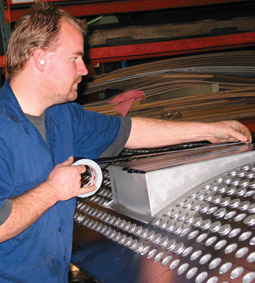
Transforming apprentices into stainless steel specialists can be a challenging but rewarding experience for employers seeking to improve quality, retain staff and increase profitability.
 Underpinning theory and practical training in stainless steel represents only a small part of TAFE fabrication education in Australia. Understanding of standard industry terms such as pickling and passivation, crevice corrosion and knowledge of all the stainless steel grades by students even after completion is minimal.
Underpinning theory and practical training in stainless steel represents only a small part of TAFE fabrication education in Australia. Understanding of standard industry terms such as pickling and passivation, crevice corrosion and knowledge of all the stainless steel grades by students even after completion is minimal.
In response to this problem, ASSDA developed the Stainless Steel Specialist Course, a 16 module training course that provides the industry with the underpinning knowledge required to meet the quality demands of architects, asset owners and end users.
Since the course was released in April 1999, it has provided more than 1000 Australian students with specialist knowledge of stainless steel, its properties, performance and uses.
In 2006, ASSDA upgraded the specialist course into an interactive e-learning flash presentation with images, animations and video for faster, more rewarding training for fabricators, sales representatives, estimators and engineers - anyone working with stainless steel.
ASSDA Major Sponsor, Atlas Specialty Metals recently enrolled more than 70 students in the new e-learning course. Mr Tony Hodges, an internal salesperson for the Melbourne branch, became the first stainless steel specialist to complete the new intermediate course.
However, two rapidly expanding Queensland ASSDA Accredited Fabricators are using the Stainless Steel Specialist Course in different ways to ensure their staff are trained and retained as quality stainless steel specialists.
Mr Len Webb, Managing Director of Bridgeman Stainless Solutions uses the course as an incentive to encourage employees to advance their knowledge of stainless steel and as a 'shortlist' for promoting motivated staff.
As a growing company, Bridgeman Stainless Solutions faces worsening skills shortages in an increasingly competitive labour market.
Mr Webb said that ”the next person that walks up to me and says I want more money or I will go and work for Billy down the road, I needed a strategy enabling me to offer more money to these employees, while retaining committed employees.”
The company offered to enrol current employees in the Intermediate Course and several took up this opportunity. Those who completed and passed the course are recognised for their efforts in the form of a bonus.
So far four of the seven tradesmen have now completed and passed the course, and as such have improved their overall knowledge of stainless steel and increased their understanding of the requirements for welding and fabrication. In turn they have all received their bonuses in recognition of their participation.
“Recognising these tradesmen were interested in doing the Specialist Course allowed me to develop a stronger more committed workforce and to give them the chance to move forward with the company. We will continue to support our tradesmen in further learning at every opportunity,” Mr Webb said.
Rockpress (Rocklea Pressed Metal)
Mr Dave Osborne, General Manager of Rockpress (Rocklea Pressed Metal) is impressed by the effect the increase in knowledge has had on the workshop floor.
At Rockpress, the course is compulsory for the majority of employees from second year apprentices to estimators and managers. In 2005, Mr Osborne enrolled 22 employees in the Full Certificate course. Two employees have already passed the course and nine people currently qualify for an Intermediate Certificate.
“Customers always put a great demand on you and it is changing everyday and we have to compete globally like everyone else does.
“This course gives them the underpinning theory on what makes stainless steel, what it is, what to watch for when they weld it, what to look for when fabricating with stainless steel.”
Many of the staff study the modules at the same time, resulting in many discussions about course topics at lunchtime. Improved knowledge of the various grades of stainless steel and correct welding practices has also meant that staff now understand enough to ask questions and can individually identify where potential failures can be prevented.
This article featured in Australian Stainless Issue 36, Winter 2006.